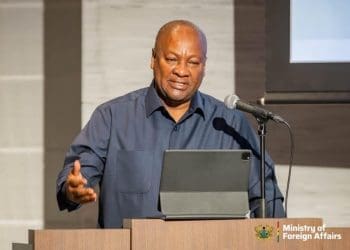A Ghanaian legal practitioner, Jonathan Owusu Asare, has invoked the Right to Information Act (RTI), 2019 (Act 989) to formally request information from the Office of the President on whether a petition has been filed seeking the removal of Justice Emmanuel Yonny Kulendi from the Supreme Court.
The letter, dated October 7, 2025, was addressed to the Information Officer at Jubilee House and received by an officer identified as Suzzy Amedi.
Mr. Owusu Asare’s request, which is grounded in Article 21(1)(f) of the 1992 Constitution, was made “in the interest of transparency, accountability, and to clarify the position of the Presidency regarding the reported petition for the removal of the respected Supreme Court Justice.”
Quoting directly from the Constitution, the lawyer reminded the Presidency that “all persons shall have the right to information, subject to such qualifications and laws as are necessary in a democratic society.”
He cited Section 18(1) of Act 989, which guarantees citizens access to official information held by public institutions, and noted that his application was driven by widespread media reports and public discussions surrounding an alleged petition against Justice Kulendi—a matter he described as being of “significant national interest.”
In the letter, Mr. Owusu Asare requested that the Presidency confirm whether a petition has indeed been filed for the removal of Justice Kulendi, the date such a petition was lodged, and whether it has been transmitted to the Chief Justice for a prima facie determination in line with Article 146(3) of the Constitution. He also asked for details of when the petition was forwarded, if applicable.
Mr. Owusu Asare reminded the Office of the President of its statutory duty under Section 23 of the RTI Act, which compels public institutions to respond to requests for information within fourteen days of receipt.
However, he urged the Presidency to expedite its response given the “utmost public interest” attached to the matter. “I shall be grateful if the requested information is offered as soon as practicable,” he added.
He provided his contact details for correspondence, noting that all communications and notices regarding the application may be sent to his email address, finestversion@gmail.com
. “This request is made in solemn exercise of my right to information, in the public interest, to ensure clarity on a matter of significant constitutional and national importance,” his letter concluded.
Mr. Owusu Asare, who holds degrees in Law and Financial Markets Regulation, emphasised that his intention was not to engage in political commentary but to promote constitutional transparency and uphold judicial independence.
He explained that the request aims to bring clarity to conflicting public claims about the alleged petition and to ensure that the Presidency’s role in the constitutional process is properly understood.
Under Ghana’s Right to Information law, the Presidency is expected to respond to the application no later than October 21, 2025, in accordance with the timelines stipulated in Act 989.
The request comes against the backdrop of reports that a private citizen, Daniel Marfo Ofori-Atta, had earlier submitted a petition to President John Dramani Mahama on October 2, 2025, calling for the removal of Justice Kulendi over alleged misconduct. However, Mr. Owusu Asare’s letter makes no judgment on the validity or substance of those allegations. Rather, it seeks to verify, through due process, whether such a petition has been formally received by the Presidency and whether the required constitutional steps have been initiated.
Observers say the move represents a significant test of Ghana’s Right to Information regime and the government’s commitment to openness in handling sensitive constitutional matters involving the judiciary.
If the Presidency responds within the prescribed time, it will mark a practical demonstration of the RTI law’s role in strengthening transparency and public accountability at the highest levels of governance.











